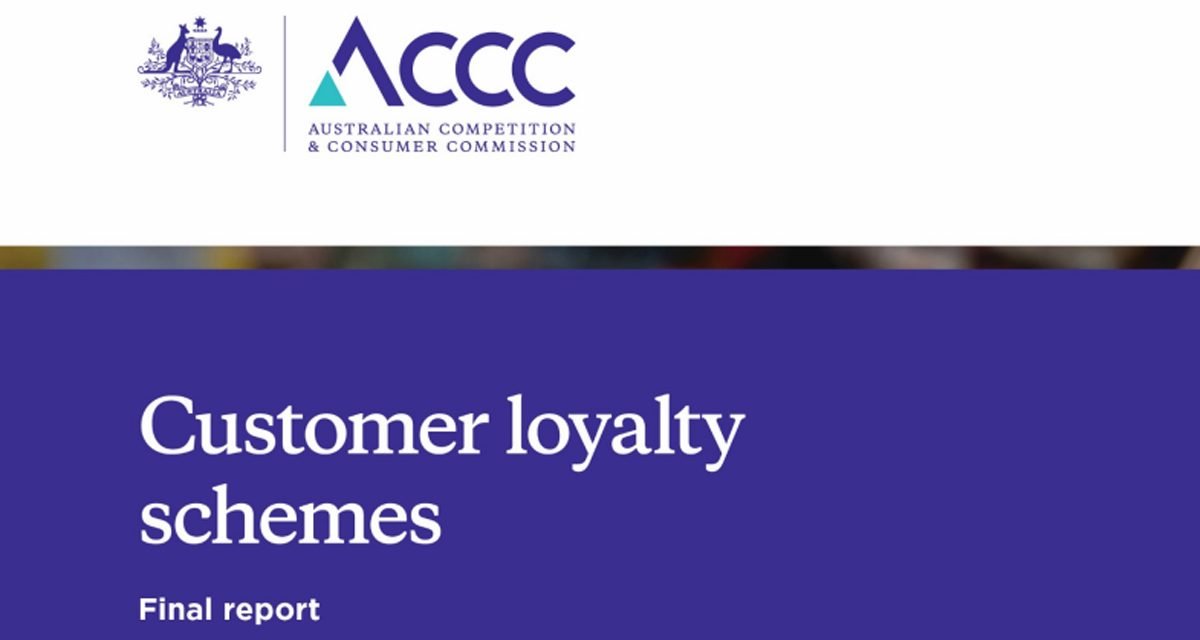
Loyalty Schemes: ACCC provides its final report

We reported earlier this year on the Australian Competition and Consumer Commission’s observations about Airline’s obedience to Australian Consumer Law. Now the ACCC has released its final report on Loyalty programs – including the two biggest loyalty programs in Australia, which are both run by Airlines: Qantas Frequent Flyer and Virgin Australia’s Velocity program.
Content of this Post:
Priority
Customer loyalty schemes and the consumer and competition issues they raise are a current priority for the ACCC. The reason being that consumers are complaining about these schemes at the rate of about 2,000 complaints over the last five years to the end of 2018.
What they are looking at
The ACCC has been looking at whether consumers are properly informed about, and receive the advertised benefits of the schemes; what data is collected and how and by whom it is used; and what impact it is having on competition between organisations in the same commercial space, or wanting to enter that industry.
The point of the exercise is to educate consumers and tell the industry what the ACCC is getting concerned about with loyalty schemes.
And their concerns are . . .
Things that will be detrimental to consumers, which might include:
- unfriendly presentations of terms conditions and privacy policies – you know – those long-winded, overly legal and complex T&C’s
- organisations that make unilateral changes to their T&C’s which are unfair to their customers
- ignoring, or not presenting options to consumers to decide how the data they provide can be collected, used, reviewed and disclosed.
And on that last point, they are particularly concerned about schemes that seek broad consents but then are vague about the use, access and disclosure of collected data, especially when there is no, or limited options about opting out.
‘Fundamentally, loyalty schemes are a marketing device with the primary objective of attracting and retaining customers. Many firms invest in loyalty schemes with the aim of gaining a competitive advantage over rivals by influencing customer behaviour to encourage repeat purchases and introduce customer resistance to competing offers or products. In this sense, loyalty schemes have a dual strategy—an offensive strategy of acquiring new customers as well as a defensive strategy of retaining existing customers.’
ACCC Customer Loyalty Schemes Final Report December 2019
You can read the report yourself – it’s quite consumer-friendly – here. But in case you are not up for that, here is a summary of the major recommendations of the report:

Recommendations
Improve how loyalty schemes communicate with customers
For Airline loyalty schemes, they particularly identify the need to provide timely information to members about approaching expiry of points balances – down to advising that the subject line of an email should say something like – ‘Your points are about to expire.’
They also wat airlines to disclose any routes or seasons or classes of travel that are not made available as ‘free’ (reward) seats.
Advance notice should be given for any change in earn or redemption rates for loyalty points so that members have time to redeem them and that airlines should consider providing compensation to existing members when such changes occur (fat chance of that!).
Prohibit unfair contract terms and practices
I think this is a toughening up of the current law that allows a contract to be voided if terms are unfair. This recommendation advocates an actual prohibition – presumably with penalties for the business if terms or practices are unfair.
Provide consumers with meaningful control over the data collected
This is to get rid of opaque privacy policies which make it impossible for consumers to make a choice about handing over their data, in return for the benefits of the loyalty scheme. The details of the recommendation cover everything from information overload in agreements, to telling consumers who their data could be handed on to.
Greater protections under the Privacy Act – and reform to privacy law
This is a big recommendation and seeks to strengthen what companies need to tell you about the information they collect, what informed consents are required and what your rights are as a consumer, including an ability to seek compensation for breaches.
Competitive effects of loyalty schemes
There are no specific recommendations under this banner, but the ACCC is indicating that it is interested in loyalty schemes impacts on competition and that it will examine these on a case by case basis, looking specifically at any barriers to market entry or market power loyalty schemes may have.

2PAXfly Takeout
It’s good to see the ACCC looking at this area.
While we think of ourselves as savvy about loyalty schemes, and even think we can manipulate them to our advantage, these schemes are huge, and the majority of members are not as sophisticated, or well informed as we are about their strengths, weaknesses and loopholes.
Transparency, disclosure, and some consumer control over data are all things that should be encouraged in the governance of loyalty schemes, privacy, data collection and use.


































What did you say?